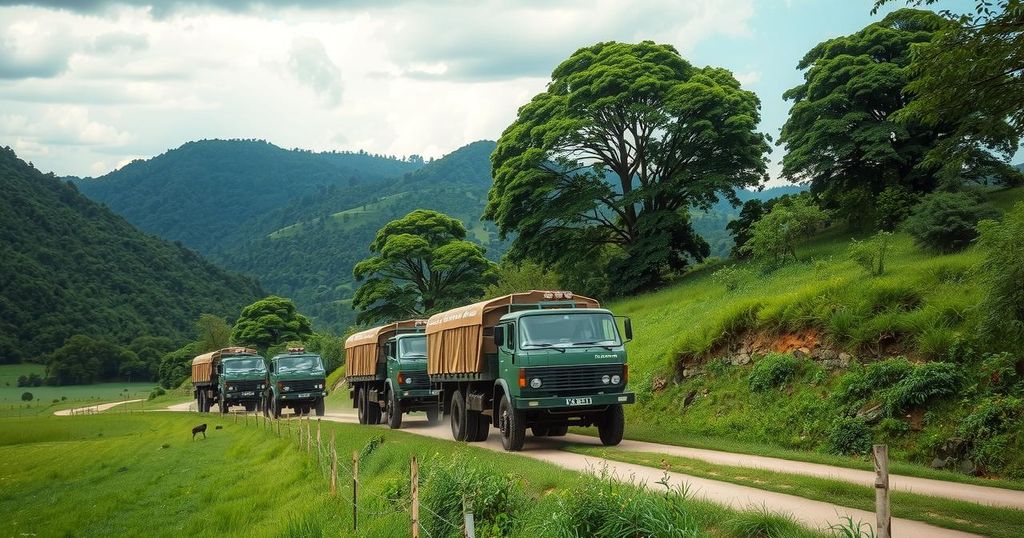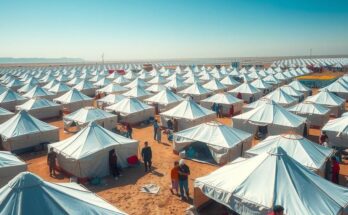Rwanda facilitated the withdrawal of Southern African troops from Congo to Tanzania on Tuesday. The Southern African Development Community had terminated its mission, stemming from a prior deployment aimed at quelling rebel activity. Rwandan officials see the withdrawal as positive for the peace process, while tensions with M23 rebels continue to escalate in the region.
In a significant maneuver, Rwanda has escorted troops from a Southern African military force across its borders, facilitating their withdrawal from the Democratic Republic of Congo (DRC) to Tanzania. This event took place on Tuesday, as confirmed by both Rwanda’s foreign minister and army spokesperson. The Southern African Development Community, or SADC, had announced in mid-March the termination of its mission mandate and commencement of phased withdrawal of what is known as the SAMIDRC force.
The SAMIDRC was deployed back in December 2023 to assist the central government of Kinshasa in its ongoing struggle against various rebel groups operating in the eastern border regions. Rwanda had protested this deployment, suggesting it would only exacerbate the already tense situation. Rwandan Foreign Minister Olivier Nduhungirehe expressed his views on social media, indicating that the SAMIDRC’s presence complicated the conflict unnecessarily. “Today’s start of withdrawal marks a positive step in support of the ongoing peace process,” he stated.
Reports indicate that many soldiers from the Southern African force had sought refuge in U.N. peacekeeping bases after the city of Goma, which is eastern Congo’s largest, fell to the Rwandan-backed M23 rebels earlier this year. According to Rwivanga, a spokesperson for the Rwandan army, a convoy of departing troops was expected to arrive in Tanzania shortly, illustrating the rapid pace of this withdrawal.
A witness account detailed a convoy of around 20 vehicles being escorted by Rwandan military personnel as they traveled from Congo into the Rwandan town of Gisenyi. This convoy reportedly carried military equipment along with Tanzanian and South African soldiers. An ambulance within the convoy bore SAMIDRC markings, and drivers hinted to observers that their destination was indeed Tanzania.
However, an M23 source mentioned that only about half of the SAMIDRC contingent stationed in Goma had exited the DRC on Tuesday. There would be additional departures in the following days. This shift follows M23’s seizure of two major cities in eastern Congo since January, heightening a longstanding conflict that has its roots entangled in Rwanda’s 1994 genocide and the ongoing battle over Congo’s valuable mineral resources.
The M23 offensive has led to a staggering death toll and the displacement of numerous civilians. Notably, Rwanda faces U.N. allegations of supplying arms and support to the M23, a claim it continues to deny. Instead, Rwanda asserts that its military actions are primarily defensive, aimed at countering threats posed by Congo’s armed forces and various allied militias.
In a controversial move, Rwanda requested the African Union and associated partners in March 2024 not to back the SAMIDRC, accusing the troops of coalition with groups linked to the genocide. Mediation attempts by Angola and Qatar have yet to yield any substantial progress toward resolution. Nonetheless, both Rwanda and Congo are reportedly working to develop a draft peace agreement, with an expectation of delivery by May 2, as outlined in an agreement made last week in Washington.
The recent withdrawal of Southern African Development Community troops from the DRC is a crucial development in the ongoing conflict there. Despite Rwanda’s protests regarding the Southern force’s initial presence, the withdrawal coincides with escalating tensions due to the M23’s activities. With mediation efforts ongoing yet unfruitful, the situation remains tense as both nations work towards a proposed peace deal. How this conflict evolves remains to be seen, particularly given the complex historical and regional dynamics at play.
Original Source: www.marketscreener.com




